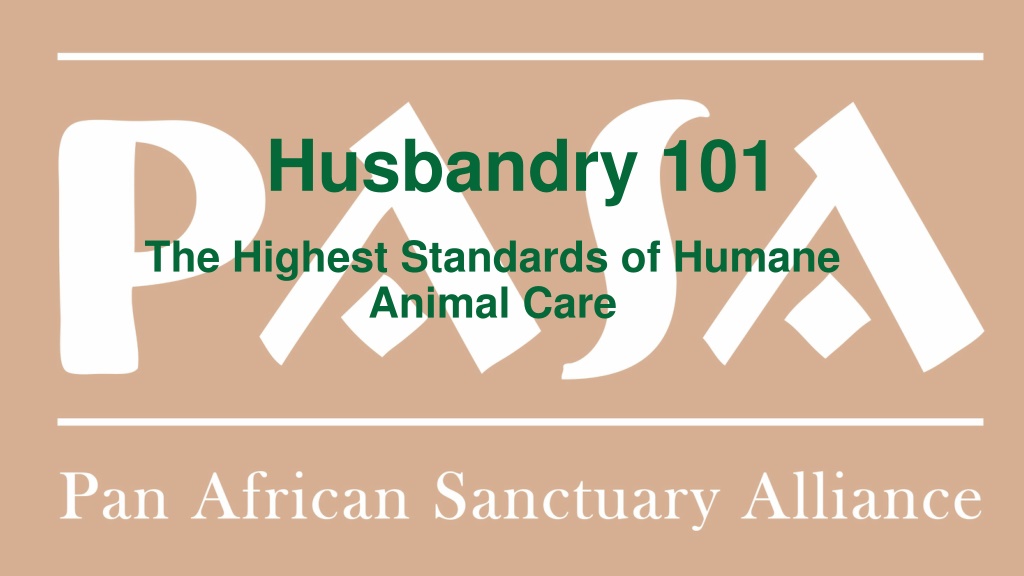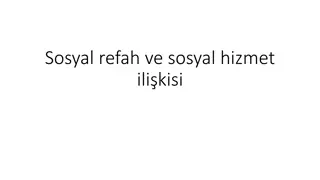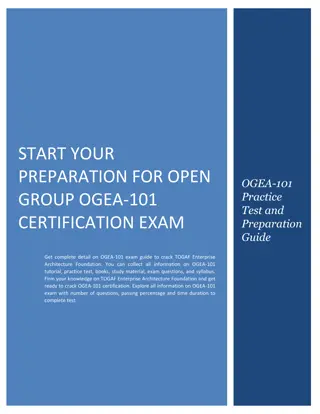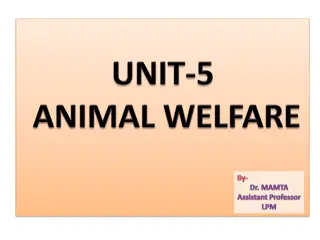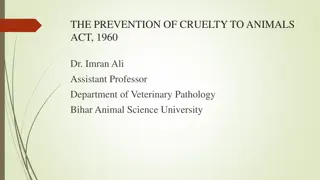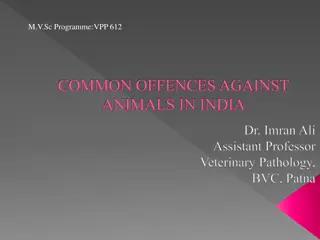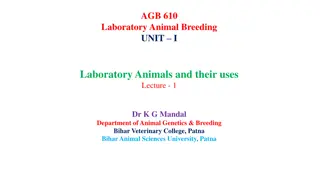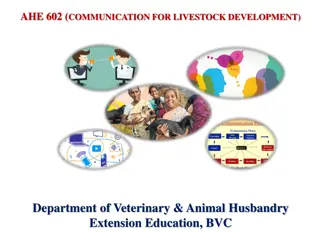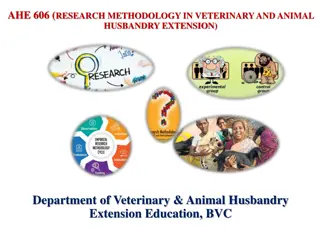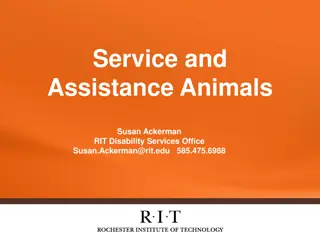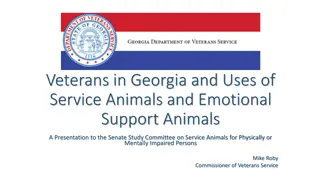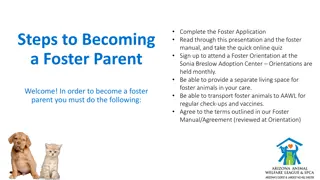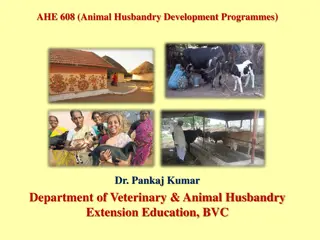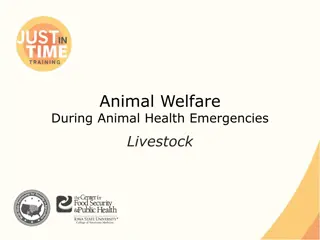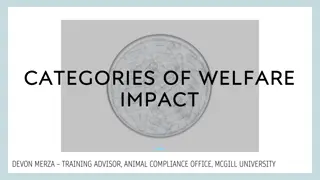Husbandry 101 - Ensuring the Welfare of Animals in Care
Our mission at Husbandry 101 is to maintain the highest standards of humane animal care by providing comfort, happiness, and health to the animals in our care. We prioritize the five basic freedoms for animals, follow facility-specific SOPs, have emergency procedures in place, and ensure new caregivers undergo necessary medical exams. Collaboration within our team is key, along with practicing good personal hygiene to prevent zoonotic disease transmission.
Download Presentation

Please find below an Image/Link to download the presentation.
The content on the website is provided AS IS for your information and personal use only. It may not be sold, licensed, or shared on other websites without obtaining consent from the author.If you encounter any issues during the download, it is possible that the publisher has removed the file from their server.
You are allowed to download the files provided on this website for personal or commercial use, subject to the condition that they are used lawfully. All files are the property of their respective owners.
The content on the website is provided AS IS for your information and personal use only. It may not be sold, licensed, or shared on other websites without obtaining consent from the author.
E N D
Presentation Transcript
Husbandry 101 The Highest Standards of Humane Animal Care
Husbandrys Mission Our purpose is to keep the animals in our care comfortable, happy, and healthy and work our hardest to provide their basic needs. Our main focus should be to provide the animals with a clean, safe environment, healthy & nutritious diets, and healthcare.
5 Basic Freedoms These guide our daily interactions with the animals in our care. Freedom from hunger and thirst Freedom from discomfort Freedom from pain, injury and disease Freedom to express normal behavior Freedom from fear and distress
Our Guidelines Facility Specific SOPs (Standard Operating Procedures) Check with your facility director for specific SOP s. These documents change and are updated regularly. No more than 2 years between updates. After each change, updated training is provided.
Emergency Procedures In order to keep the animals in our care safe, we must all know what to do in an emergency. Please review the specific emergency procedures for your facility as soon as possible.
New Caregivers You will get to know the animals by both physical traits and personalities. Always expected the unexpected. Always expect the unexpected. Our chimps like to keep us on our toes.
New Caregivers Required thorough medical exam Vaccinations Fecal tests HIV tests No contact with primates in your first two weeks.
Working with a Team Regular communication Respectful behavior and conversation Cooperation with veterinary & education team members as well as administrative & research teams
Importance of Personal Hygiene To Minimize Transmission of Zoonotic Disease Work clothes remain on site If you or a family member are ill, please stay home Smoking, eating, drinking or spitting are not permitted in animal areas Wash hands regularly Disposable gloves should be worn when handling sick animals People with open cuts or sores on their hands should wear disposable gloves Keep hands away from your face when working in animal areas Do not put pencils, pens etc. into your mouth.
Daily Routines Feeding Cleaning Record Keeping/Monitoring Groups Assisting other staff Providing enrichment Cooperative learning Socialization/Integration
Cleaning Trainer will explain and show methods for cleaning. You re going to get your hands dirty. Your trainer will go over specifics to each area as to what is required to clean. Don t worry about cleaning quickly to start out. Just get it clean. Speed will come with time and experience.
Regular Cleaning 1. Ensure all hard surfaces are washed at least once a day or as frequently as necessary to keep them free from contamination. 2. Clean benches, shelves, ropes and climbing structures frequently enough to prevent the accumulation of fecal matter and urine. 3. Where possible and especially in small enclosures, daily spot-clean soil and other natural substrates to remove organic waste. 4. After using disinfectant, thoroughly rinse watering devices, feeding equipment and other metal or plastic equipment. 5. Provide primates with access to dry areas during and after the cleaning process.
Additional Things to Keep in Mind 1. Ensure all enclosures allow access to an area such as a satellite cage, sleeping cage, or night den, suitable for the physical isolation of individuals so that animals can be restricted for close examination and veterinary treatment. 2. Ensure that when possible, all transfers of adult primates from one location to another are conducted in such a manner that caregivers and primates are not sharing common space. 3. Consider that all infant primates require physical contact with their mother or a surrogate to ensure normal psychological and social development. Sanctuaries that care for infant primates have appropriate contact protocols
Other Duties Enclosure and equipment maintenance Pest control Reintroduction Promote normal species behavior
Social Groups Human interference and contact should be minimal. Non-human primates are housed in social groups at all times. The only exception is during quarantine in the weeks after arrival or if an individual is injured or suspected to harbor an infectious disease.
Social Groups & Monitoring Monitor social groups daily for aggression, injuries, and other anti-social behavior. While animals are feeding, observe them for injuries and anti-social behavior and to ensure all individuals receive appropriate amounts of food. Ensure that animals are actually eating what is being fed (i.e. not preferentially taking certain items). For great apes & small groups of monkeys, visually account for each individual at each feeding; for large groups of monkeys count individuals at least daily.
Thank you! PASAprimates.org facebook.com/PASAprimates gregg@pasaprimates.org
The PASA Primate Care Training Program is made possible by a generous grant from Fondation Brigitte Bardot.
